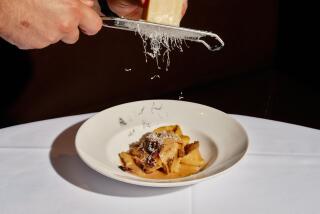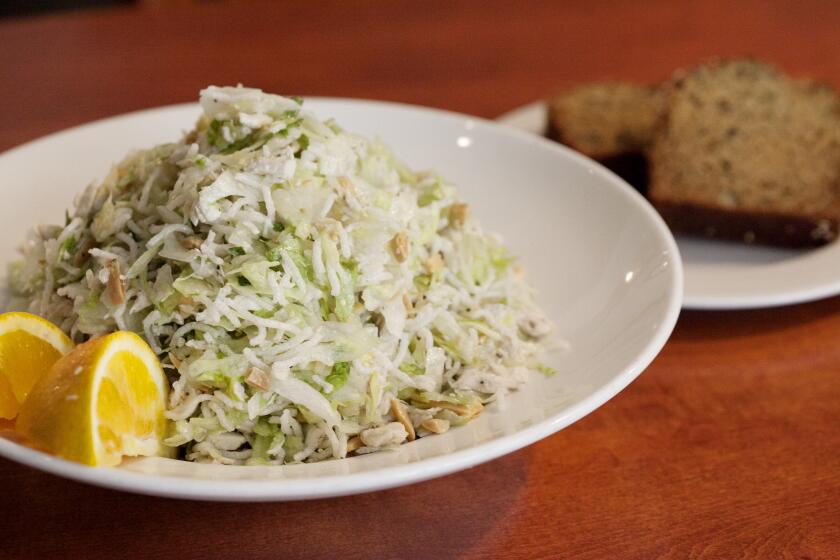Tempest in a Pasta Pot
Last week we asked whether, as the International Trade Commission has argued, “most people probably cannot distinguish between different dried pastas.” Apparently our readers can. By more than a 3-to-1 margin, you told us in no uncertain terms what you thought of American macaroni. Here are some of the responses.
*
Can we tell the difference between Velveeta and French Brie? Yes. Can we tell the difference between American and Italian pasta? Yes. Do we buy Velveeta? No. Do we buy DeCecco? Yes.
MICHAEL BAYER
Culver City
*
The ITC and the American “noodle” industry are wrong in arguing that it is impossible to distinguish among different brands of dried pasta. My family absolutely can tell the difference. . . . I gave up on the American brands years ago because they cooked inconsistently and were difficult to get al dente. I primarily buy DeCecco (because in my experience, it cooks most consistently), but for a few shapes there are other brands I prefer (primarily Barilla). Fie on the American companies for ultimately costing the American consumers more and for confusing price and quality. Protectionism like this ultimately always hurts consumers, because we end up paying more for inferior products.
CATHY LYNN COSTIN
Los Angeles
*
This article on pasta smacks of baloney. Of course pastas taste and feel different. Taste, smell, consistency, body, freshness, all contribute to its palatability. To believe they don’t is like saying all breads are the same merely because [they are] made of two basic ingredients. I buy Creamette, Ronzoni and DeCecco as well as others, but I feel I’m treating myself when I buy DeCecco because it has substance and to me costs a lot more than the others. When Americans make pasta as good as DeCecco, they will sell more pasta.
ANTOINETTE GIRGENTI LANE
Via the Internet
*
American pasta is an inferior product. Instead of getting government rulings, American producers of pasta should try to improve their product. I buy only imported Italian pasta, and I can tell the difference. The ITC should have to get out and earn a real living, and I do not plan to buy American pasta.
MARIANNE KOONTZ
Pasadena
*
Different brands of pasta definitely also have different taste because they cook differently. For example, DeCecco is a pasta that cooks hard; it is for people who want it very al dente. Buitoni is a pasta that cooks soft; it is for people who like to have their pasta a little more cooked. Ronzoni is in between; it cooks to a softer al dente, but if you cook it longer, it becomes mushy. Most of the Greek pasta, as another example, cooks softer. I have not found a brand of U.S. pasta that cooks the same way DeCecco does.
LUISA MONTESANO-RODITIS
Via the Internet
*
There is a significantly different taste and quality among dry pastas. We choose DeCecco because of the taste and texture and the available shapes and styles. The “comparable” types made by Ronzoni or others just wilt in the pot and are flavorless. We used to eat Buitoni, which became Contadina, and now there are very few shapes available. I hope the same thing doesn’t happen to DeCecco, or we’ll all be back to elbow macaroni.
MARTA GARDNER
Los Angeles
*
There is very little difference between brands of dried pasta. I’ve tried everything from the cheap dump bins to those sold in the “exclusive markets.” Of course, this should be expected. If one reads the ingredients, they are almost all identical.
JOE KRAATZ
Vista
*
Italian imported pasta quality surpasses that of American pasta by far. Most Italian pasta companies are owned by families that have been making pasta for centuries. They use care in the manufacturing process, by doing things Americans won’t take the time for, such as heating the water before it’s added to the semolina wheat, mixing it gently and drying it slowly. American plants simply churn out pasta as quickly as they can, greatly reducing its quality.
I would pay an extra dollar for imported pasta any time in order to get the best quality. There is a difference, not only in the taste, but in the texture and durability of the pasta. The pasta I use, Rummo Imported Pasta, won’t fall apart or make the water turn white. It cooks al dente every time and doesn’t get bloated, white or sticky.
KELLY ROACH
Redondo Beach
More to Read
Eat your way across L.A.
Get our weekly Tasting Notes newsletter for reviews, news and more.
You may occasionally receive promotional content from the Los Angeles Times.









